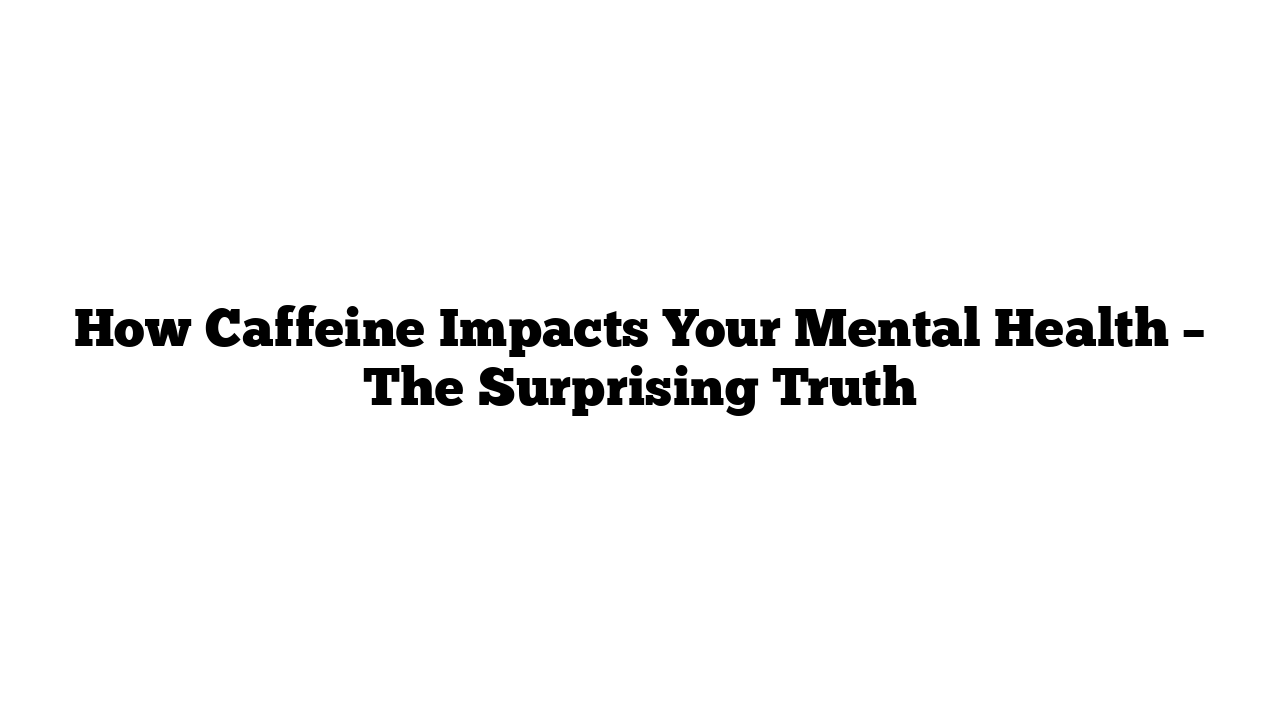Introduction: The Prevalence of Caffeine and Its Mental Health Implications
Caffeine is everywhere—from coffee to energy drinks to soft drinks—and it’s an integral part of life for many people. In the USA alone, over 90% of adults regularly consume caffeine, with the average intake surpassing 200 milligrams per day, which is equivalent to more than two cups of coffee or five cans of soda. While caffeine offers a noticeable boost, its effects on mental health are worth examining. So, does caffeine help or hurt your mental well-being? Let’s delve into the research to uncover both the benefits and the risks of caffeine on mental health.
1. Caffeine and Mental Health Disorders: A Double-Edged Sword
Do you suffer from a mental health condition like anxiety or depression? If so, you might be wondering how your daily cup (or cups) of coffee impacts your mental state. For people with anxiety, for example, caffeine can potentially intensify symptoms. According to the Bronfenbrenner Center for Translational Research, caffeine may trigger anxiety, particularly for individuals sensitive to its effects. This sensitivity can lead to increased heart rate and blood pressure, common anxiety symptoms that may worsen the condition in some people.
In a study published in the journal Psychiatry Research, researchers noted that people with anxiety disorders often experience heightened sensitivity to caffeine, leading them to consume less or avoid it altogether. This increased sensitivity could exacerbate symptoms, especially if caffeine-induced heart palpitations mirror anxious feelings.
On the flip side, caffeine may benefit certain individuals with specific mental health needs. For example, a small study by Stanford University showed that 7 out of 12 participants with Obsessive-Compulsive Disorder (OCD) experienced improvement when they consumed 300 milligrams of caffeine daily. These findings suggest that caffeine’s effects on mental health are highly individualized, reinforcing the importance of knowing how your own body reacts.
2. Caffeine, Sleep Disorders, and Insomnia
Many people rely on coffee to keep them alert and focused, but this perk may come at the expense of sleep quality. Caffeine can reduce the amount of restorative sleep we get by decreasing slow-wave sleep and limiting REM sleep. According to a study published in Advances in Psychiatric Treatment, high doses of caffeine can increase wakefulness and delay the onset of sleep, particularly when consumed in the evening.
If you’re finding it hard to fall asleep after drinking caffeine, it might be time to rethink when—and how much—you consume. Lack of sleep is tied to numerous mental health issues, so cutting back on caffeine could be beneficial for improving sleep quality and, by extension, your overall mental health.
3. Mental Performance: Can Caffeine Sharpen Your Mind?
One of caffeine’s most celebrated benefits is its ability to boost mental performance. Research summarized by Verywell Mind shows that caffeine enhances various cognitive tasks, including vigilance, response times, and information processing. However, more caffeine does not necessarily mean better performance. Studies show that moderate caffeine consumers often perform better than those with a high intake, so moderation is key when aiming to benefit from caffeine’s performance-enhancing properties.
Interesting Fact: In a 2012 study, individuals who had lower daily caffeine intake saw a more noticeable performance boost than those who consumed caffeine frequently throughout the day. This highlights how tolerance affects caffeine’s impact.
4. Caffeine Withdrawal: The Hidden Risks of Dependence
If you’ve ever skipped your morning coffee and felt sluggish or irritable, you’re likely familiar with caffeine withdrawal. The American Psychological Association (APA) recognizes caffeine withdrawal syndrome as a legitimate condition, often marked by headaches, fatigue, trouble concentrating, and even mild depression. Many people unknowingly use caffeine to stave off these symptoms, with some unaware of why they feel so lethargic and irritable without it.
For adolescents and children, who may not connect their symptoms to a lack of caffeine, withdrawal can be particularly confusing. Understanding caffeine’s potential to create dependence is vital in helping people make informed choices about their consumption.
What Does This Mean for You?
The effect of caffeine on mental health varies widely depending on the individual. If you’re someone who feels great with a cup of coffee in the morning and experiences no adverse effects, moderate caffeine consumption can be a helpful tool. However, if caffeine leads to increased anxiety, disrupted sleep, or a sense of dependence, consider cutting back and monitoring how you feel.
Moderation is crucial for those looking to enjoy the benefits of caffeine without its downsides. If you’re unsure about how caffeine affects you, try reducing your intake for a week and noting any changes in your mental health, sleep quality, or overall mood. You may be surprised by the results!
For more insights into how diet and lifestyle impact mental health, visit medicaltimes.io.
